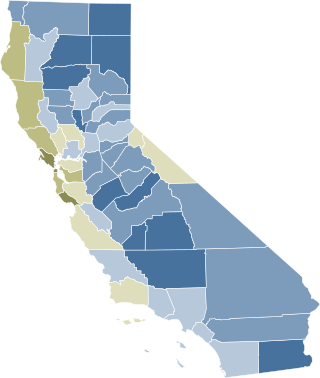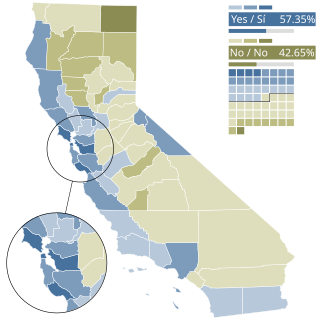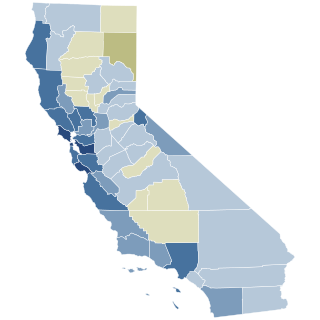
In California, a ballot proposition is a referendum or an initiative measure that is submitted to the electorate for a direct decision or direct vote. If passed, it can alter one or more of the articles of the Constitution of California, one or more of the 29 California Codes, or another law in the California Statutes by clarifying current or adding statute(s) or removing current statute(s).

California Proposition 14 was a November 1964 initiative ballot measure that amended the California state constitution to nullify the 1963 Rumford Fair Housing Act, thereby allowing property sellers, landlords and their agents to openly discriminate on ethnic grounds when selling or letting accommodations, as they had been permitted to before 1963. The proposition became law after receiving support from 65% of voters. In 1966, the California Supreme Court in a 5–2 split decision declared Proposition 14 unconstitutional under the equal protection clause of the United States Constitution. The U.S. Supreme Court affirmed that decision in 1967 in Reitman v. Mulkey.

Proposition 4, or the Abortion Waiting Period and Parental Notification Initiative, also known to its supporters as Sarah's Law, was an initiative state constitutional amendment in the 2008 California general election.

Proposition 8, known informally as Prop 8, was a California ballot proposition and a state constitutional amendment intended to ban same-sex marriage; it passed in the November 2008 California state elections and was later overturned in court. The proposition was created by opponents of same-sex marriage in advance of the California Supreme Court's May 2008 appeal ruling, In re Marriage Cases, which followed the short-lived 2004 same-sex weddings controversy and found the previous ban on same-sex marriage unconstitutional. Proposition 8 was ultimately ruled unconstitutional by a federal court in 2010, although the court decision did not go into effect until June 26, 2013, following the conclusion of proponents' appeals.

Arizona Proposition 102 was an amendment to the constitution of the U.S. state of Arizona adopted by a ballot measure held in 2008. It added Article 30 of the Arizona Constitution, which says: "Only a union of one man and one woman shall be valid or recognized as a marriage in this state." The amendment added a constitutional ban on same-sex marriage to existing statutory bans in place since 1996. In October 2014, Article 30 of the Arizona Constitution was struck down as unconstitutional in the United States District Court for the District of Arizona, and is no longer enforced by the state of Arizona, which now allows and recognizes same-sex marriages.

Proposition 66 was a California ballot proposition on the November 2, 2004 ballot. It was a proposed amendment to the California three-strikes law. Prop 66 would have required the third felony charge against a suspect to be especially violent and/or serious crimes to mandate a 25-years-to-life sentence. It also would have changed the definition of some felonies. It was rejected by voters, with 52.7% voting against the proposition.

Proposition 1B was a defeated California ballot proposition that appeared on the May 19, 2009 special election ballot. The measure was legislatively referred to the ballot by the State Legislature. If passed it would have secured additional funding for primary education. Additionally, Proposition 1B would have only passed if Proposition 1A passed as well.

California Proposition 59 is a non-binding advisory question that appeared on the 2016 California November general election ballot. It asked voters if they wanted California to work towards overturning the Citizens United U.S. Supreme Court ruling.

California state elections in 2018 were held on Tuesday, November 6, 2018, with the primary elections being held on June 5, 2018. Voters elected one member to the United States Senate, 53 members to the United States House of Representatives, all eight state constitutional offices, all four members to the Board of Equalization, 20 members to the California State Senate, and all 80 members to the California State Assembly, among other elected offices.

California Proposition 68 was a legislatively referred constitutional amendment that appeared on ballots in California in the June primary election in 2018. It was a $4.1bn bond measure to fund parks, environmental projects, water infrastructure projects and flood protection measures throughout California.

The 2020 California Proposition 18 would allow 17-year-olds to vote in primary and special elections if they will turn 18 by the subsequent general election.

California Proposition 19 (2020), also referred to as Assembly Constitutional Amendment No. 11, is an amendment of the Constitution of California that was narrowly approved by voters in the general election on November 3, 2020, with just over 51% of the vote. The legislation increases the property tax burden on owners of inherited property to provide expanded property tax benefits to homeowners ages 55 years and older, disabled homeowners, and victims of natural disasters, and fund wildfire response. According to the California Legislative Analyst, Proposition 19 is a large net tax increase "of hundreds of millions of dollars per year."

Proposition 1, titled Constitutional Right to Reproductive Freedom and initially known as Senate Constitutional Amendment 10 (SCA 10), was a California ballot proposition and state constitutional amendment that was voted on in the 2022 general election on November 8. Passing with more than two-thirds of the vote, the proposition amended the Constitution of California to explicitly grant the right to an abortion and contraceptives, making California among the first states in the nation to codify the right. The decision to propose the codification of abortion rights in the state constitution was precipitated in May 2022 by Politico's publishing of a leaked draft opinion showing the United States Supreme Court overturning Roe v. Wade and Planned Parenthood v. Casey in Dobbs v. Jackson Women's Health Organization. The decision reversed judicial precedent that previously held that the United States Constitution protected the right to an abortion.
The following is a list of ballot measures which were on the ballot for the 2022 United States elections. Some were held prior to the federal elections on November 8. Many were initiated by state legislatures, while others were initiated by public petitions. In all, there were 141 ballot measures on ballots across most U.S. states and the District of Columbia at any point throughout the year.
A total of 124 ballot measures were placed on statewide ballots in 2020 across the United States:
The following is a list of ballot measures which appeared on the ballot in the United States in 2010.